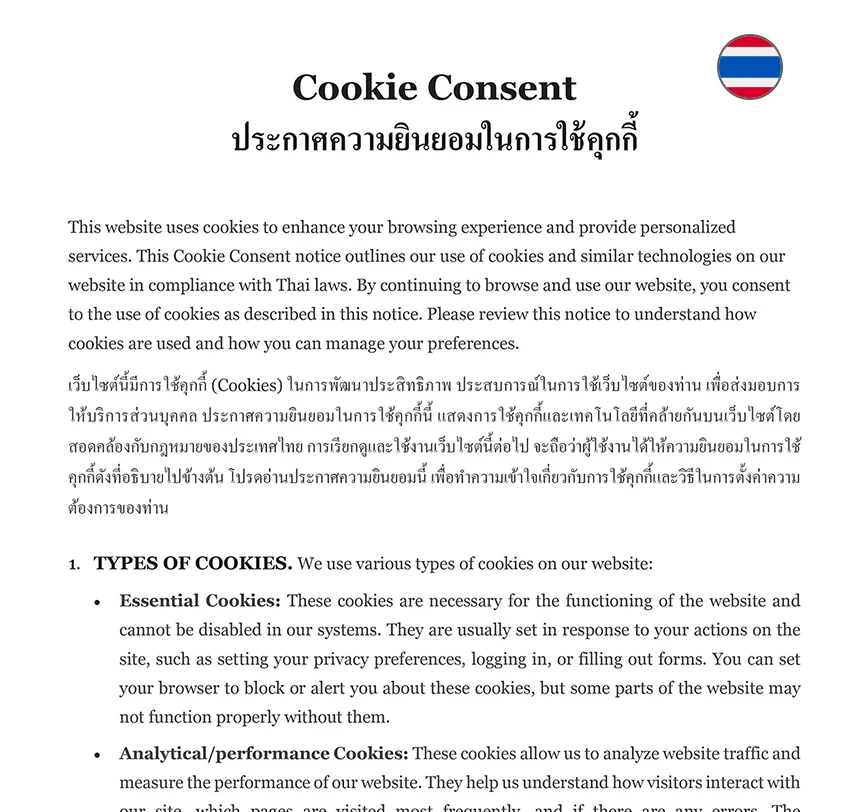Ready to use legal template
Drafted by experienced lawyers
Certified Thai-English translation
Ready to use legal template
Drafted by lawyers
Translated in Thai-English
Home › Intellectual property › Cookie Consent
Learn more about Cookie Consent
A Work from Home Policy is a contract between an employer and an employee that sets the expectations and duties of workers who work from home. It may also specify who is qualified to work from home, how to apply for work from home credentials, and the approval procedure. A robust work from home policy can assist your firm in navigating the challenges that are commonly connected with remote working. In order to master correctly this new way of working, Themis Partner accompanies you in the drafting of a work from home policy. A template in Word format can be downloaded but you can also call upon our partner lawyers if you wish to draft a work from home policy tailored to your needs.
Table of contents
What is website Cookie Consent?
Website Cookie Consent refers to the practice of obtaining user permission before placing cookies or tracking technologies on their devices while they interact with your website. Cookies are small text files that store information about user activities, preferences, and behaviors. This consent is crucial for adhering to data protection regulations and respecting user privacy. When visitors arrive at your website, a cookie consent notice is displayed, explaining the types of cookies used, their purpose, and the option for users to accept or decline their usage. By providing users with the choice to control their data, website owners demonstrate transparency, enhance user trust, and ensure compliance with data privacy laws.
Why is Cookie Consent important in Thailand?
Cookie Consent holds significant importance in Thailand due to the country’s data protection regulations, notably the Personal Data Protection Act (PDPA). Obtaining user consent before using cookies and tracking technologies is a fundamental aspect of respecting user privacy rights.
Cookie Consent allows website owners to inform users about the data collected, stored, and processed through cookies, fostering transparency and trust. Compliance with the PDPA is essential, as it mandates that individuals have control over their personal data. By implementing proper Cookie Consent mechanisms, website owners not only adhere to legal requirements but also demonstrate their commitment to safeguarding user data and upholding privacy standards in the digital realm of Thailand.
What are cookies and tracking technologies?
Cookies and tracking technologies are integral components of online interactions, serving various functions that enhance user experiences on websites. Cookies are small text files stored on users’ devices when they visit a website, containing information about their browsing activities, preferences, and interactions. These files facilitate tasks like remembering login credentials, personalizing content, and analyzing user behavior to improve website functionality.
Tracking technologies, including pixels and scripts, work alongside cookies to gather insights into user engagement and behavior. They help website owners understand how visitors interact with their platforms and make informed decisions about optimizing user experiences. While cookies and tracking technologies offer valuable benefits, their usage also raises data privacy concerns. Implementing transparent Cookie Consent practices empowers users with control over data collection and aligns with evolving data protection laws.
How does website Cookie Consent work?
Website Cookie Consent operates as a crucial step in user data privacy management. When users visit a website, they encounter a Cookie Consent notice, which informs them about the use of cookies and tracking technologies. This notice typically appears as a banner or pop-up, explaining the purpose of cookies and the types used on the site. Users are presented with the option to either accept or decline the use of cookies.
If they choose to accept, the website can then place cookies on their devices, enhancing user experience through personalized content and functionalities. However, if users decline, no cookies are stored, ensuring their data remains untracked. This consent mechanism not only adheres to data protection regulations but also empowers users to make informed choices about their online privacy, contributing to a transparent and respectful digital environment.
What should a Cookie Consent notice include?
A comprehensive Cookie Consent notice encompasses vital information that empowers users and ensures transparency in data usage. It should clarify the types of cookies and tracking technologies employed on the website, detailing their functions and purposes. Additionally, the notice should outline how user data is collected, processed, and shared, emphasizing adherence to data protection regulations like the PDPA. Users need to understand the options available to manage their cookie preferences, including the ability to accept or decline cookies. To enhance user trust, the notice should highlight the website’s commitment to data security and privacy.
It’s crucial to provide clear instructions on how users can access more detailed information, reach out for inquiries, or modify their consent choices. A well-crafted Cookie Consent notice aligns with legal obligations, fostering user confidence in your website’s data practices.
How does Cookie Consent ensure compliance with PDPA?
Cookie Consent plays a pivotal role in aligning website practices with Thailand’s Personal Data Protection Act (PDPA). This legislation mandates that individuals retain control over their personal data. By obtaining user consent before deploying cookies and tracking technologies, websites respect user privacy and fulfill PDPA requirements. Cookie Consent notices educate users about data collection, processing, and sharing, ensuring transparency. Users have the autonomy to accept or decline cookies, allowing them to manage their data exposure.
This proactive approach not only safeguards user rights but also demonstrates a commitment to PDPA compliance. By integrating Cookie Consent mechanisms, websites uphold data protection principles and contribute to a responsible and respectful digital ecosystem in Thailand.
SPECIAL OFFER
eCommerce
5 Document Package
Essential website/app policies for online business in Thailand
Website Cookie ConsentTemplate (.docx)
Easy and quick to customize
310 client reviews (4.8/5) ⭐⭐⭐⭐⭐
Share information
Why Themis Partner?
Easy legal documents at your fingertips
Make trusted documents for hundreds of purposes.
Hundreds of documents
Instant access to our entire library of documents for Thailand.
24/7 legal support
Quick legal advice from our network of qualified lawyers.
Easily customized
Editable Word documents, unlimited revisions and copies.
No translation fees
Certified Thai-English translation included for all documents.
Legal and Reliable
Documents written by lawyers that you can use with confidence.
Free consultation
Free lawyer consultation on each new matter.




